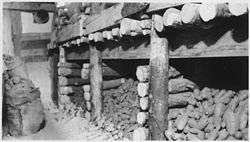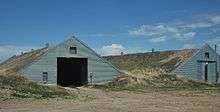Root cellar

A root cellar is a structure built underground or partially underground and used to store vegetables, fruits, and nuts or other foods.
Function

Root cellars are for keeping food supplies at a low temperature and steady humidity. They keep food from freezing during the winter and keep food cool during the summer months to prevent spoilage. Typically, a variety of vegetables are placed in the root cellar in the autumn, after harvesting. A secondary use for the root cellar is as a place in which to store wine or home-made alcoholic beverages.
Vegetables stored in the root cellar primarily consist of potatoes, turnips, and carrots. Other food supplies placed in the root cellar over the winter months include beets, onions, jarred preserves and jams, salt meat, salt turbot, salt herring, winter squash, and cabbage.[1] A potato cellar is sometimes called a potato barn or potato house.
Separate cellars are occasionally used for storing fruits, such as apples. Water, bread, butter, milk, and cream are sometimes stored in the root cellar also. In addition, items such as salad greens, fresh meat, and jam pies are kept in the root cellar early in the day to keep cool until they are needed for supper.[2]
Construction
Common construction methods are:
- Digging down into the ground and erecting a shed or house over the cellar (access is via a trap door in the shed).
- Digging into the side of a hill (easier to excavate and facilitates water drainage).
- Building a structure at ground level and piling rocks, earth, and/or sod around and over it. This may be easier to build on rocky terrain where excavation is difficult.
Most root cellars were built using stone, wood, mortar (cement), and sod. Newer ones may be made of concrete with sod on top.[2]
See also
References
- ↑ Tortorello, Michael (6 November 2008). "Food Storage as Grandma Knew It". The New York Times. p. D1. Retrieved 1 November 2010.
- 1 2 An Old Time Dugout Root Cellar